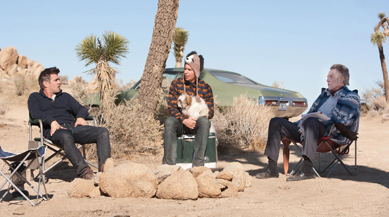The 400-Word Review: Seven Psychopaths
By Sean Collier
October 12, 2012
BoxOfficeProphets.com

So Seven Psychopaths is a violent movie about a writer and a tiny, helpless animal.
This isn’t to condemn the auteur’s second film, though, as derivative. While Seven Psychopaths owes something to McDonagh’s plays The Pillowman and The Lieutenant of Inishmore — and borrows its lead and milieu from his debut film, In Bruges — it is an original creation that meditates on the source of creativity and the role of one’s friends in one’s work.
You know, in the midst of a gleeful, hilarious, peyote-fueled bloodbath.
Our lead, somewhat conspicuously, is an Irish writer named Marty (Colin Farrell). He’s trying to put together a movie, title-first, about, well, a septet of violent criminals. He’s borrowed one lunatic, a obsessive Quaker (Harry Dean Stanton,) from a tale told by his off-kilter buddy Billy (Sam Rockwell;) he thinks he can take another from news reports about a vigilante with an obvious calling card.
Meanwhile, Billy is working as a dog kidnapper for bizarre septuagenarian Hans (Christopher Walken,) who’s bilking doting pooch lovers for reward money to pay for cancer treatments for his wife (Linda Bright Clay). When the small-time crooks inadvertently nab the Shih Tzu of mob boss Charlie (Woody Harrelson,) though, Marty may have found his story.
As if the preceding names didn’t already comprise a murderer’s row, there’s more. The cast also includes Michael Pitt, Abbie Cornish, Kevin Corrigan, Gabourey Sidibe, Tom Waits and Olga Kurylenko, to name but a few. And as expected, a great deal of the fun in Seven Psychopaths just involves the joy of watching the oversized personalities of these performers bounce off of one another.
But like most of McDonagh’s work, the story is the star. Like nearly no other writer working in film or theater today, he’s able to densely pack his creations, allowing threads to unravel into Shakespearean conclusions. The notion that any tight result could emerge from the frenetic and varied stories thrust upon the audience in the film’s first half seems shocking; when it all comes together, it’s uproarious and satisfying. McDonagh writes the scripts that Quentin Tarantino wishes that he could. No wonder such a dynamic group of performers flocks to them.